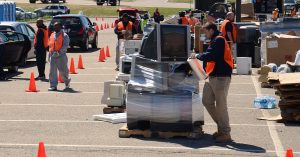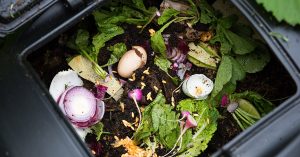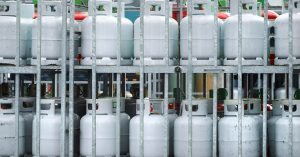 Camden County Recycler, Spring 2022
Camden County Recycler, Spring 2022
A Publication By the Camden County Board of Commissioners

Featured Stories
- A Message from the Camden County Board of Commissioners
- Statewide Bag Ban Goes into Effect in May 2022
- Be Careful with That Rechargeable Lithium Battery
- County Moves to Improve Convenience for Electronics Recycling Programs and for Document Shredding Events
- Reduce Your Carbon Footprint at Home with Backyard Composting!
- Tanks and Compressed Gas Cylinders
- Camden Powers-Up: Commissioners, Congressman Norcross Unveil Electric Bus Infrastructure in Camden City

A Message from the Camden County Board of Commissioners
The Commissioners of Camden County remain steadfast in our commitment to improve our county’s overall environmental health. With Spring and Summer months upon us and the re- cent celebration of Earth Day, now is the perfect time to share our plans to enhance our environment.
The following projects encompass all aspects of sustainability; from promoting recycling by providing local shredding event sponsorships to all municipalities, to expanding our bike share program to at least one county park this summer. We will also be giving away thousands of totes and reusable bags as the state prepares to eliminate all single use plastic bags from retail establishments on May 4th.
Some of our larger initiatives include building and expanding our electric vehicle charging infrastructure and replacing our fleet of county vehicles with electric to reduce our carbon footprint and save taxpayers money at the gas pump. We will also continue to work with our utility providers to replace thousands of streetlights with LED bulbs to reduce power usage and modernize our street and park lighting.
In addition to energy-efficient vehicles and lighting, we plan to preserve more green space for our community, and protect and maintain critical natural areas. Our latest open space purchase in Winslow Township will add another 80 acres of green property in Camden County.
On top of these initiatives, we joined Governor Murphy, Congressman Donald Norcross, and the New Jersey Department of Environmental Protection to create a new crown jewel in our park system. The former Harrison Avenue landfill of Camden City has been transformed into a waterfront park, complete with passive recreation, fishing piers and boat launches right on the Delaware River. This previously blighted property is now a beacon for our county and provides walking trails and spectacular views of both the Cooper and Delaware River, as well as the Philadelphia city skyline.
The Board of Commissioners manages about 2,700 acres of park land and thousands of annual plantings every spring. Considering the size and scope of this project, we began growing plants locally at our sustainability campus greenhouses in Gloucester Township to save taxpayers money and shrink our carbon footprint.
At this same campus, we will continue utilizing our hydroponic greenhouse to grow food for the patrons of Cathedral Kitchen and the Neighborhood Center in Camden City. We also plan to open the first Sustainability Center in South Jersey this spring to provide programming and educational events for our community to combat climate change and go carbon neutral.
Furthermore, the Commissioners of Camden County are ad- vancing our strong partnership with our county’s representative in Congress to make our county cleaner, safer, and healthier. With input from the community, Congressman Norcross has delivered $500,000 in federal funding to reduce large-scale illegal littering and pollution in our neighborhoods.
Lastly, after suspending household hazardous waste collection events in 2020 due to the pandemic, we got back on track last year by receiving and processing 317,890 pounds of hazardous waste from more than 4,500 Camden County households.
These are just a handful of projects and initiatives the Com- missioners are working on to build a greener, more sustainable future for our county. We encourage all residents to participate at both the municipal and county-level in the programs, projects and events highlighted throughout this edition of The Recycler.
 Statewide Bag Ban Goes into Effect in May 2022
Statewide Bag Ban Goes into Effect in May 2022
On November 4th, 2020, Governor Phil Murphy signed one of the nation’s most stringent bag bans into law. Effective May 4, 2022, no retail, grocery, or foodservice business can provide or sell single-use plastic carry out bags to their customers. Additionally, grocery stores are not permitted to provide or sell paper bags.
Items exempt from the law for a limited time include spoons, straws, small portion cups, meat and fish trays, and pre-packaged foods. While not banned under this legislation, plastic straws can only be provided by a foodservice business at the customer’s request. These exemptions could be extended indefinitely at the discretion of the New Jersey Department of Environmental Protection.
As stores transition out of providing paper and plastic bags, some may offer reusable bags or totes for a fee while others may not. To account for stores that may not, and for spontaneous shopping trips, it is recommended that residents keep a few reusable bags in their vehicle if able. Reusable bags are defined as being made of polypropylene, PET non-woven fabric, nylon, cloth, hemp product, or other machine washable fabric with a stitched handle. Please keep an eye out for reusable bag giveaways at upcoming County events.
Environmental Impact of Plastic
Plastic is the most prevalent type of debris found in our oceans. It can come in all shapes and sizes, but those that are less than five millimeters in length (or about the size of a sesame seed) are called microplastics. Since plastic isn’t biodegradable, it ends up either in landfills or as litter on the landscape and in waterways. Plastic can take hundreds of years to decompose and can release toxins into the soil and water in the process.
Littered plastic is also a huge problem for the health of wildlife and our human food supply, as animals may mistake it for food and develop breathing and digestion issues after consuming.
Another reason for banning plastic bags is their fossil fuel burden. Plastic is not only made from petroleum, but producing it typically requires a lot of fossil-fuel-derived energy. The fact that Americans throw away some 100 billion plastic grocery bags each year means we are drilling and importing millions of barrels worth of oil and natural gas just to have a convenient way to carry home groceries.
“Plastic bags have been found to be a significant contributor to litter in our environment and interfere with the recycling process when placed in a curbside recycling container. While this legislation will require our residents to adjust to the change it will bring, in time these adjustments will become second nature, and our environment will benefit” said Commissioner Nash, liaison to the Camden County Division of Environmental Affairs.
 Be Careful with That Rechargeable Lithium Battery
Be Careful with That Rechargeable Lithium Battery
From cell phones to laptops, power tools, and electric vehicles, rechargeable lithium-ion batteries are becoming increasingly prevalent in our lives. By 2025, it’s estimated that the global lithium battery market will surpass $100 billion.
While rechargeable lithium batteries are recyclable, care must be taken to do so properly. Batteries of any kind should never be placed in curbside recycling containers, as they have led to fires breaking out and, in some cases, destroying recycling facilities. These batteries burn at extremely high temperatures, making them dangerous to people and property. Fortunately, there are several free and convenient ways to recycle them safely.
One way is to bring them to locations that participate in a targeted battery recycling program, like Home Depot, Lowes, and Staples. Countrywide, most retailers with battery drop-off stations receive their containers from Call2Recycle, a nonprofit organization. New Jersey counties recently teamed up with Call2Recycle to produce a statewide battery awareness campaign geared towards its residents. The Avoid the Spark NJ campaign has its own website where residents can find convenient drop off locations and learn more about proper battery safety and identification (see links at the bottom of this article).
Another option is to bring them to a municipal electronics recycling location. Many towns accept rechargeable lithium batteries free of charge if they are attached to an electronic device or power tool, like laptops, cell phones, and cordless drills. Numerous Camden County municipalities often sponsor year-round electronics recycling collection programs. Contact your local public works department to find out your municipality’s electronic waste recycling guidelines.
A third option is to bring batteries attached to electronic devices to a state-permitted electronic waste recycling facility, such as Magnum Computer Recycling in Pennsauken
(856) 333-0991 or Tab Shredding Inc. in Berlin (856) 768-4402. Tab Shredding does charge a fee. It is advised to schedule appointments before dropping items off.
Lastly, residents can bring all rechargeable batteries and single-use lithium batteries to any of the county’s Household Hazardous Waste Collection events. Please note that only loose batteries are accepted at these events- electronic devices are not accepted. See page 8 for the 2022 collection events schedule.
Camden County Commissioner and liaison to the Division of Environmental Affairs, Jefferey Nash, expressed the importance of proper recycling. “With the proliferation of lithium batteries in our society, it is imperative they are handled responsibly and safely. The consequences of not disposing of these items in the proper way can create undue risks to our community and undermine the health and welfare of our residents. The Board of Commissioners encourages all residents to use one of the many convenient in-county recycling locations for these and all rechargeable batteries.”
To learn more about proper handling of all types of batteries, and to find convenient drop-off locations near you, visit: call2recycle.org/avoid-the-spark-nj or CamdenCounty.com/LithiumBatteries.
 County Moves to Improve Convenience for Electronics Recycling Programs and for Document Shredding Events
County Moves to Improve Convenience for Electronics Recycling Programs and for Document Shredding Events
Prior to the pandemic, County electronics collection events steadily lost participation to more convenient municipal collection / drop-off programs and local businesses that accept electronic waste. Many of these drop-off programs are open to the public year-round, providing a convenient opportunity to recycle electronic waste. Among local businesses to offer free and convenient electronic disposal services is Magnum Computer Recycling in Pennsauken.
In a similar vein, the County strives to improve its shredding events by reducing the long lines and wait times caused by the hundreds of residents converging on a single location. To accomplish this, a more localized model similar to electronic waste disposal was adopted.
One of the County’s approaches to creating more convenient recycling and disposal programs for its residents was utilizing State Recycling Enhancement Act (REA) grant funding to establish a sponsorship program for municipalities that agreed to hold their own shredding events. In 2021, this enabled residents to shred sensitive documents locally while saving time, fuel, and protecting the environment. Municipalities who participated in this county-sponsored program received up to $1,000 to fund a local shredding event. Smaller towns that opted for joint shredding events with neighboring towns were each eligible for up to $1,000 in funding as well.
In total, nine municipalities took advantage of this sponsorship program and generated 73,406 pounds of shredded paper for recycling. Building on this first-year success, the County will once more offer sponsorship for shredding events to interested municipalities in 2022.
In tandem with municipality efforts, the County plans to hold a single countywide shredding event this year on June 4th at the Woodcrest PATCO High Speedline station in Cherry Hill from 9 a.m. to 2 p.m.
 Reduce Your Carbon Footprint at Home with Backyard Composting!
Reduce Your Carbon Footprint at Home with Backyard Composting!
While all organic matter breaks down in time, there are easy steps you can take at home to effectively speed up the process. The homemade compost you produce can then be used to nurture your plants, garden, and more around your property.
Step 1
Purchase or construct a bin approximately 1 cubic yard in size (3’x3’x3’) or use an open area in your yard without a bin. The size of the bin/area is important for obtaining the proper temperature to aid in the decomposition process. If the bin/pile is too small, it will not generate enough heat to promote the microbial activity essential for decomposition. If the bin/area is too large, it will not allow enough air to reach the microbes in the center.
Step 2
Mix two-parts brown material (leaves, straw, small twigs,
etc.) with one-part green material (grass clippings, vegetable scraps, etc.). This 2:1 ratio provides the best mix of carbon (leaves) with nitrogen (grass) to promote optimal decomposition. Materials such as kitchen scraps or twigs will decompose quicker with increased surface area, so break them into smaller pieces when possible. Also, to avoid unpleasant odors and vermin, never put red meat or poultry into your compost bin/pile. See the lists below for items you can add to your compost, as well as items you should avoid.
Items You CAN Compost
NITROGEN (GREEN, WET)
• Grass clippings • Weeds
• Vegetables
• Fruit scraps
• Coffee grounds & filters • Tea bags
• Eggshells
CARBON (DRY, BROWN)
• Dead leaves • Hay or straw • Cornstalks
• Sawdust
• Dried, brown grass clippings • Newspaper*
• Food-soiled cardboard*
*Shred and add in small quantities
Items You SHOULD NOT Compost at Home
• Grease or oil
• Dead animals
• Diseased plants
• Fatty foods
• Any meat or bones
• Human and/or pet waste • Treated wood
• Coal
• Pesticide-treated plants • Weeds with seeds
Step 3
Water your bin/pile as needed to maintain a level of moisture like that of a wrung-out sponge.
Step 4
Compost needs air to decompose. Turning the compost assists the breakdown of materials and helps to prevent any potential odors.
Step 5
When the compost is finished, it should look and smell like rich soil. This means it’s ready to use for your garden, flowerbeds, potted plants, and lawn.
 Tanks and Compressed Gas Cylinders
Tanks and Compressed Gas Cylinders
Propane Cylinders:
Propane fuel is sorted into two groups: refillable tanks and single-use (“disposable”) cylinders/ canisters. 20 lb. refillable propane tanks are commonly used with barbecue grills, heaters, and forklifts.
Single-use cylinders come in two basic styles: a short, fat tank (16.4 oz.) typically used for portable appliance cooking and lanterns, and a tall, skinny tank (14.1 oz.) typically used for torch fuel.
Most 20 lb. propane tanks and single-use cylinders are accepted at Camden County Household Hazardous Waste Program events.
Fire Extinguishers:
Non-rechargeable, residential dry chemical fire extinguishers can be properly disposed of at a Camden County Household Hazardous Waste Program event.
Rechargeable commercial extinguishers are not accepted at these events. Please contact the supplier/ manufacturer for proper disposal information.
Helium Tanks:
Helium is non-toxic and inert. Please contact the manufacturer of this product for proper guidelines. Note: small single use party balloon filling tanks can be recycled at a County Household Hazardous Waste event.
Other Compressed Gas Tanks/Oxygen Tanks:
For compressed gas cylinders/tanks or oxygen tanks, please contact the supplier for proper handling and disposal procedures. These tanks are not accepted at County Household Hazardous Waste Events. All tanks should be handled carefully and must not be punctured since they may be under extreme pressure and/or may contain combustible gas.
Camden Powers-Up: Commissioners, Congressman Norcross Unveil Electric Bus Infrastructure in Camden City
Commissioner Jeffrey Nash joined Congressman Donald Norcross and Mayor Victor Carstarphen to unveil groundbreaking electric bus charging infrastructure at the Newton Avenue Bus Garage, a first of its kind initiative in Camden City.
These chargers and related technology upgrades represent the next step in NJ TRANSIT’s goal of transitioning to a 100% zero-emissions bus fleet by 2040 “Electric vehicles are the way of the future and having this electric bus charging infrastructure here in Camden City will allow us to utilize more sustainable means of public transportation and rely less on carbon emitting, traditional vehicles,” said Commissioner Nash, who also serves as the liaison to the county’s Environmental Commission. “We’re excited to have such a transformative initiative underway here in our city and we hope to be an example to other municipalities to show that investing in renewable energy will benefit our communities and our planet in the long run.”
The agency’s first eight battery electric buses will be deployed in Camden City later this year. Mayor Victor Carstarphen discussed his excitement to see this initiative underway in Camden City.
“I commend Governor Phil Murphy for helping reduce emissions not only in Camden but across New Jersey,” Carstarphen said. “I’m also grateful to Congressman Donald Norcross for advocating for sustainable initiatives and transformation-
al projects that improve the quality of life for residents. It makes me proud to know that NJ TRANSIT’s new electric bus charging stations at Newton Avenue Garage will be a first of its kind. This is a huge step towards making NJ TRANSIT greener and it shows a strong commitment to not only being environmental responsibly to customers riding NJ TRANSIT buses but also to all those living in the surrounding area.”
The project in Camden will test electric buses in real world conditions on specific routes to provide invaluable data and information on the effects of weather, passenger volume, road and other factors on electric bus performance, including travel distance available between recharging.
The project will also review the infrastructure resources and work required to modernize bus garages to accept new charging stations and the greater power feeds needed to energize them.
“With the successful installation of the charging infrastructure at our Newton Avenue bus garage, which will support our eight electric buses arriving later this year, NJ TRANSIT celebrates a significant milestone on our roadmap to a 100% zero-emissions bus fleet,” said Kevin S. Corbett, NJ TRAN- SIT’s president and chief executive officer. “NJ TRANSIT’s Zero-Emissions Bus Program is aligned with Governor Murphy’s Energy Master Plan and we remain committed to achieving our goal of a fully zero-emissions bus fleet by 2040.”
